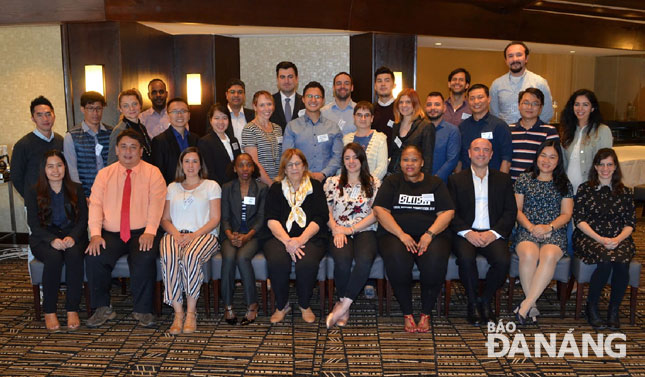Valuable lessons learnt from 'Startup Nation' Israel
In November, Ho Quang Dung, the Deputy Director of the Da Nang Entrepreneurship Support Company Ldt (DNES), also known as the Da Nang Incubator, was one of the 26 people worldwide to have been selected by MASHAV, which is Israel's Agency for International Development Cooperation, to attend a training course on startup ecosystem in this Middle Eastern country.
 |
| Dung (2nd row, 4th from left), along with the other trainees participating in the Israel course on start-up ecosystem development |
During his recent interview with DA NANG Newspaper, Dung shared his unforgettable startup experiences and lessons he learned from his month and a half trip to Israel, which has earned the moniker of ‘Startup Nation’ mostly because it has largest number of startups per capita in the world.
Entrepreneurship has become the national pastime in Israel, with hundreds of venture capital firms and thousands of startups, shared working spaces and startup accelerators flocking to Silicon Wadi, Israel’s very own coastal version of San Francisco’s Silicon Valley.
Recalling his experiences during the first day of his trip in Haifa, Israel's third largest city, Dung said he was very impressed by the professional organisation of the training course.
Accordingly, the activities within the course are diverse with discussions and personal experience sharing sessions, and trips to Israeli startup facilities, Jerusalem and the official Holocaust memorial and museum, plus classes launched at the Technion – Israel Institute of Technology.
The course aimed at allowing trainees to have a deeper insight into the specific characteristics of Israel which have made it successful in terms of startups.
During the course, a Vietnamese trainee raised a question for a Professor Jaime Amsel, the CEO of Poiesys, a management consultancy dedicated to enhance innovation and entrepreneurship skills of managers all over the world: “How to distinguish “creativity” from “innovation” as in Viet Nam, these 2 words are often used with the same meaning?”. The professor responded that “creativity” is to create new ideas, whilst “innovation” is to turn those ideas into reality.
Professor Amsel pointed out to some main reasons why Israel has affirmed its stature as the world's leading innovation country.
On a narrow strip of land in the Middle East, the Israeli people surpassed the harshness of nature by their own creativity and hard work. They planted the seeds of hope on this land. Today, this Middle Eastern country is a global tech and startup hub.
It is noticeable that Israeli people like to argue with one another. Any organisation truly bent on innovation knows that passionately discussing things is a great way to come up with new ideas.
After having joined in the Israel course, Dung acknowledged that he has learned many valuable lessons from one of the world's most innovative countries that can be applied into the development of the Da Nang start-up ecosystem.
He noted that creative start-ups must be based on research-development (R & D) activities. In reality, many world-renowned brands have chosen Israel as their ideal investment destination because this country boasts considerably thriving R&D activities.
In Da Nang, R&D should focus on researching and enhancing the quality of technologies available everywhere.
He also remarked, by the time a customer reaches out to you, that customer has reached a pain point-a trouble spot that leads to action. The better you understand what they’re really looking for, the more likely you are to meet their needs, and create satisfied customers. Read on to learn how to ease your customers’ pain points, and create loyalty and satisfaction.